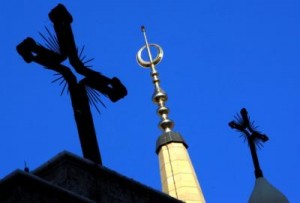 First Congregational United Church of Christ and the Islamic Society of Southwest Washington are less than 300 yards apart. Together, the two communities want to embody a tenet of both their faiths: love of neighbor. On Sunday, April 28th, three members of the Islamic Society of Southwest Washington visited their Christian neighbors on NE 68th Street in Hazel Dell as they spoke on a panel and painted a picture of Islam in Vancouver. Over previous Sundays, the church’s adult education program had presented other classes on Islam in preparation for the visit.
First Congregational United Church of Christ and the Islamic Society of Southwest Washington are less than 300 yards apart. Together, the two communities want to embody a tenet of both their faiths: love of neighbor. On Sunday, April 28th, three members of the Islamic Society of Southwest Washington visited their Christian neighbors on NE 68th Street in Hazel Dell as they spoke on a panel and painted a picture of Islam in Vancouver. Over previous Sundays, the church’s adult education program had presented other classes on Islam in preparation for the visit.
The panel discussion was planned well before the Boston marathon bombing made Islam a subject in the mainstream media. In his opening remarks, the Rev. Dr. Brooks Berndt of First Congregational United Church of Christ noted, “When events like the Boston marathon bombing happen, in the broader society there can be an indiscriminate backlash against Islam.” He observed how the actions of a few individuals can be taken incorrectly to define and represent an entire faith.
In his remarks, Dr. Khalid Khan from the Islamic Society of Southwest Washington picked up on Berndt’s observation. He pointed out that there is a tremendous amount of diversity in a religion with 1.6 billion adherents. He stated, “Does the Taliban represent all Muslims? No. There are more than 56 countries that have a majority of Muslims, and if you go there, you will see lots of variety.”
The Islamic Society of Southwest Washington is itself very diverse with a large population of immigrants from a range of different countries and regions. Khan described their community as being around 30% Bosnian and 30% Arabic. There are additionally persons who were born in the United States and converted to Islam. One of the three panelists was Tervaris Evans who converted to Islam as an adult. His own family is a model of religious cooperation and harmony. His wife is a Christian. His step-daughter is being raised as a Christian, while his son is being raised as a Muslim.
A recurring theme in the discussion that took place at the event was that of stereotypes of Muslims. In his remarks, Khalid Elolaimi commented that when many people hear the word “terrorist,” Muslims are the first association that comes to mind. He observed how when he presents himself to people as a Muslim, they typically already have a built-in image. Elolaimi came here from Kuwait in 1982, and he recalled how the first movie he saw portrayed Muslims as terrorists. He observed how this kind of portrayal has not stopped. It is a continual feature of television shows and movies.
In his remarks, Elolaimi also addressed how Islam is frequently linked with violence in a way that unfairly places responsibility and blame upon the religion. He asserted, “When people act, they act on their own behalf. They don’t act on behalf of their religion or their state or country.” As an example, he stated that Timothy McVeigh did not act on behalf of the United States or the Christian world in committing the Oklahoma City bombing. Instead, he acted on his own behalf.
In reflecting back on the panel, Berndt states, “We are glad to have members of the Islamic Society of Southwest Washington represent themselves and present their own picture of Islam because so often the mainstream media feeds us a steady diet of demonizing and demeaning stereotypes.”
The event ended on a note of hope. A member of the audience recognized that the basic belief of loving one’s neighbor is shared by both faiths. In response, Khan recalled how after 9-11, a group of Muslim and Christian scholars and leaders wrote a letter that lifted up this common theme shared by the two religions. The letter can be found at www.acommonword.com.